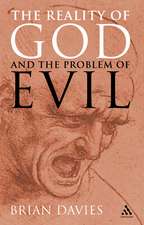Relating God and the Self: Dynamic Interplay
Autor Jan-Olav Henriksenen Limba Engleză Paperback – 31 mai 2017
| Toate formatele și edițiile | Preț | Express |
|---|---|---|
| Paperback (1) | 416.22 lei 6-8 săpt. | |
| Taylor & Francis – 31 mai 2017 | 416.22 lei 6-8 săpt. | |
| Hardback (1) | 1110.14 lei 6-8 săpt. | |
| Taylor & Francis – 23 aug 2013 | 1110.14 lei 6-8 săpt. |
Preț: 416.22 lei
Nou
Puncte Express: 624
Preț estimativ în valută:
79.65€ • 82.29$ • 66.29£
79.65€ • 82.29$ • 66.29£
Carte tipărită la comandă
Livrare economică 26 martie-09 aprilie
Preluare comenzi: 021 569.72.76
Specificații
ISBN-13: 9781138103818
ISBN-10: 1138103810
Pagini: 216
Dimensiuni: 156 x 234 x 12 mm
Greutate: 0.45 kg
Ediția:1
Editura: Taylor & Francis
Colecția Routledge
Locul publicării:Oxford, United Kingdom
ISBN-10: 1138103810
Pagini: 216
Dimensiuni: 156 x 234 x 12 mm
Greutate: 0.45 kg
Ediția:1
Editura: Taylor & Francis
Colecția Routledge
Locul publicării:Oxford, United Kingdom
Notă biografică
Jan-Olav Henriksen has been Professor of Systematic Theology and Philosophy of Religion in Norwegian School of Theology since 1994. He has co-authored or authored approximately 30 books within a wide range of theological and philosophical subjects and has also been Director of the Interdisciplinary Research School, Religion, Values and Society which is set up by six Norwegian universities and colleges. Henriksen has been Alan Richardson Fellow at Durham University (UK) and Research Fellow at Center of Theological Inquiry, Princeton, New Jersey. Henriksen is an established voice on the Nordic theological scene, and has contributed to several international research projects. He has also contributed to Ashgate's Key Theological Thinkers.
Recenzii
’Henriksen’s text is marked with an existential nerve. Drawing on relevant theories from philosophy of religion, systematic theology and psychology of religion he opens up a fascinating, creative space for discussions about the development of the Human Self in its relation to God. His way of analysis and argument is theoretically well informed, sharply critical and constructive. He broadens the interpretation of religion in significant ways by giving serious attention to the meaning and function of emotions and psychodynamic processes in religious experience. I find this especially fruitful. It enriches the discussion about how religion and religious symbols actually work in the process of developing a meaningful Self.’ Leif Gunnar Engedal, Norwegian School of Theology, Norway 'This book identifies itself as 'a study of the philosophy of religion, understood as a discipline that benefits from the interdisciplinary exchange between theology, philosophy and psychology' (p. 2). Within that broad framework, it seeks to set out a fresh approach to the relation between God and the self, and to do so, engages with a commendable range of thinkers, from different periods and disciplines.' Modern Believing 'Henriksen's brilliant book explores the ways in which religious symbols and metaphors function within the lives of individual selves in both theological and psychosocial perspectives. ... Theologians, pastoral counselors, chaplains, and scholars of the psychology of religion will find this book to be invaluable reading.' Religious Studies Review
Cuprins
Acknowledgments; Introduction: God and the Self; Chapter 1 From Soul to Self; Chapter 2 On What Psychology May Say About “God” and the Self; Chapter 3 The Theologies of Relational Pathologies and their Alternatives; Chapter 4 Self, God and Religion: The Hermeneutical Interplay;
Descriere
By discussing critically different ways the symbol of God functions in the formation of the self, this book develops a nuanced and original approach to the interplay between God and the self. It suggests that play is actually an important metaphor in order to develop a dynamic understanding of religion’s way of relating God and the Self. This approach challenges understandings of religion focussing only its cognitive claims, as well as those who emphasize doctrinal orthodoxy as the most important element in religion.
















